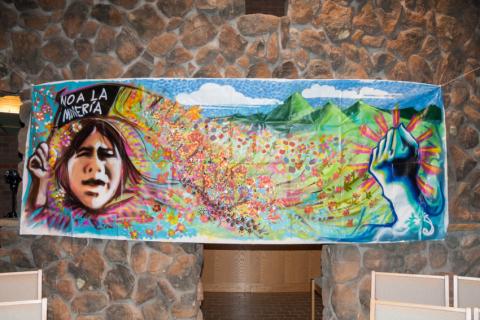- Home
- About Us
- Issues
- Countries
- Rapid Response Network
- Young Adults
- Get Involved
- Calendar
- Donate
- Blog
You are here
About Us
IRTF MISSION
The InterReligious Task Force on Central America (IRTF) is a Cleveland-based interfaith group that promotes peace and human rights in Central America and Colombia. People of faith and conscience founded IRTF after the 1980 execution of four U.S. church women in El Salvador by U.S.-trained soldiers. (The Cleveland mission team lost Jean Donovan and Sister Dorothy Kazel.)
Carrying on the legacy of the martyrs, IRTF educates, advocates, and organizes for peace and human rights, economic justice, and aid to Central Americans and Colombians. IRTF works to change U.S. policies, corporate actions, and consumer behaviors that undermine these aspirations, both here and abroad.
The Task Force is an interfaith group with the following mission:
- To follow our various faith teachings, commitments, and convictions which call us to promote justice and peace with the people of Central America.
- To advocate for human rights, self-determination, economic justice and peace based on nonviolent systemic changes, instead of militarized approaches in the region and in U.S. policy.
- To build bridges of solidarity, especially between faith communities, with the most consistently martyred and oppressed peoples in our hemisphere.
IRTF HISTORY
The Cleveland InterReligious Task Force on Central America (IRTF) had its roots in the work of the Cleveland Central America Solidarity Committee (CASC) that formed in 1979 following the overthrow of the Nicaraguan dictator, Somoza. The solidarity work in Cleveland included much education and consciousness-raising throughout the community concerning the liberated Nicaraguan people's efforts at self-determination through their literacy crusade, health-care campaigns and their struggles for economic independence. CASC provided extensive analysis, particularly through their newsletter, of the history of El Salvador, Nicaragua, Guatemala and Honduras, a history that was primarily characterized in the 20th century by oppressive regimes and widespread human rights violations, much of which were caused by US foreign policy and support for the military forces behind the Central American governments.
When the violence exploded in El Salvador in 1980 with the March assassination of Archbishop Romero followed in December by the murder of four US Catholic missionary women--two of them from Cleveland--several people active in Central America solidarity work formed the InterReligious Task Force to focus Central America education and support in local faith communities. (Killed were Cleveland Mission Team members Sr. Dorothy Kazel OSU and Jean Donovan.) Since that time the Task Force has worked in collaboration with national organizations such as the Religious Task Force on Central America and Mexico and Witness for Peace, as well as local faith-based and other social concerns groups to promote peace and human rights in Central America as part of the faith call to justice and peace through nonviolence. The Central America Network Newsletter (CANN), jointly produced by CASC and IRTF, had wide circulation in the 1980s and '90s.
The work of the IRTF has included the annual commemoration of the martyrs of Central America, hosting speakers and education forums, participating in study and work delegations to Central America, Colombia and to the US-Mexico border where many Central American refugees fled from the wars in their countries.
During the 1980s, IRTF played a key role in working with Jubilee Partners and the Overground Railroad as the liaison for local support of refugees awaiting US political asylum hearings and/or acceptance into Canada. Through the IRTF, members of local congregations took refugees into their homes.
In 1987 IRTF initiated the Rapid Response Network for Human Rights in Guatemala. Volunteers wrote letters to protest urgent human rights abuses. RRN members added their names and addresses, and they were faxed to government officials. The scope of RRN quickly expanded to include the other Central American nations and later Colombia. By 2003, RRN volunteers were responding to six human rights cases each month.
IRTF exposes the connections between strong-armed repression and economic oppression. Since the 1990s when the armed conflicts formally ended, the Task Force has deepened its focus on the economic and human rights injustices that continue to exacerbate poverty in Central America. IRTF's work shines the spotlight on the negative effects of globalization, which include ecological destruction, privatization of utilities, public services and other resources, increase in sweatshops and diminished sustainability because of free trade policies initiated and promoted by the US. Some current efforts to address these policies include extensive legislative advocacy, the Rapid Response Network, work to close the US School of Americas that trains Latin American soldiers in civilian-targeted warfare, and wide-spread promotion of fair trade policies and products. Because of the work of IRTF and its supporters, NE Ohio quickly became one of the largest markets for fair trade coffee in the US.
Continued faith-based reflection and bridge-building efforts with the most consistently martyred and oppressed peoples in our hemisphere led the IRTF to include Colombia in its solidarity work. At the request of the United Church of Christ in October 2000, IRTF hosted Mennonite pastor Rev. Ricardo Esquivia, Director of Justapaz and Co-Coordinator of the Permanent Assemby of Civil Society for Peace. Rev. Esquivia asked IRTF to extend its solidarity to the mostly indigenous and Colombians of African descent being killed and forced from their homes by the armed conflict, now being fueled by billions of U.S. dollars. With three million internally displaced persons and ten civilians killed daily, Colombia has been described as "the new El Salvador."
[Thanks to IRTF co-founder Sr. Mary Hurley, HM for writing this history of the InterReligious Task Force].

